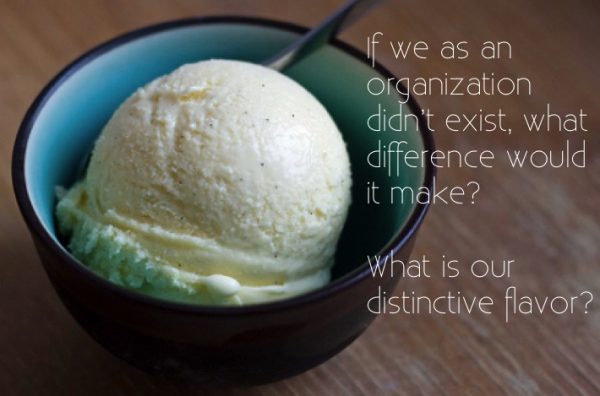Benchmarking is an aspect of strategic planning that has been widely accepted in recent years. It is the practice of comparing one’s organizational products or performance to others considered industry bests. Much can be said in its advocacy, but it has one potentially serious liability: benchmarking can result in vanilla ice cream.
Benchmarking Best Practices
The typical benchmarking process happens when management identifies “best practices” in their respective field, and compares the results and processes of those studied to one’s own results and processes. In this way, the organization learns how well – or how poorly – they are performing in an attempt to make adjustments that emulate the effective organizations. Tools used in benchmarking include Performance Benchmarking, Informal Benchmarking, SWOT, and Best Practice Benchmarking. Countless authors, consultants, and coaches have established benchmarking as an industry standard that informs the “what” and “how” of organizational development.
Benchmarking the Why
However, many maturing organizations – especially in the not-for-profit sector – are limping not due to failure on the “what do we do?” or “how do we do it?” questions, but because they have not recently revisited their “why” question. They are copying others that are considered the gold standard before seriously clarifying the big issue: “If we didn’t exist, what difference would it make?” The result if often a bland “vanilla ice cream” purpose that lacks inspiration.
Like millions of other Americans, I typically choose to go to certain stores or restaurants because they provide something I cannot get anywhere else. If this is true in the profit sector, then it is even more critical for Christian organizations that exist to fulfill a distinctive mission. Why else would we bother?
Jesus’ Why
One day Jesus encountered Zacchaeus, a tax collector who had cheated the good folks of Jericho out of their hard-earned cash. When the people heard Jesus announce that he would be Zach’s house guest, they “murmured” about his choice of dinner companions. They expected Jesus to “benchmark” himself against the “best practices” of other religious leaders. Instead, Jesus responded by providing one of the most famous “why” statements in history:
For the Son of Man came to seek and save the lost” (Luke 19:10).
That’s a distinctive competence. And our world has never been the same.
Why does your organization exist? How is the world different because of you? What is your distinctive flavor?

Leave a Reply